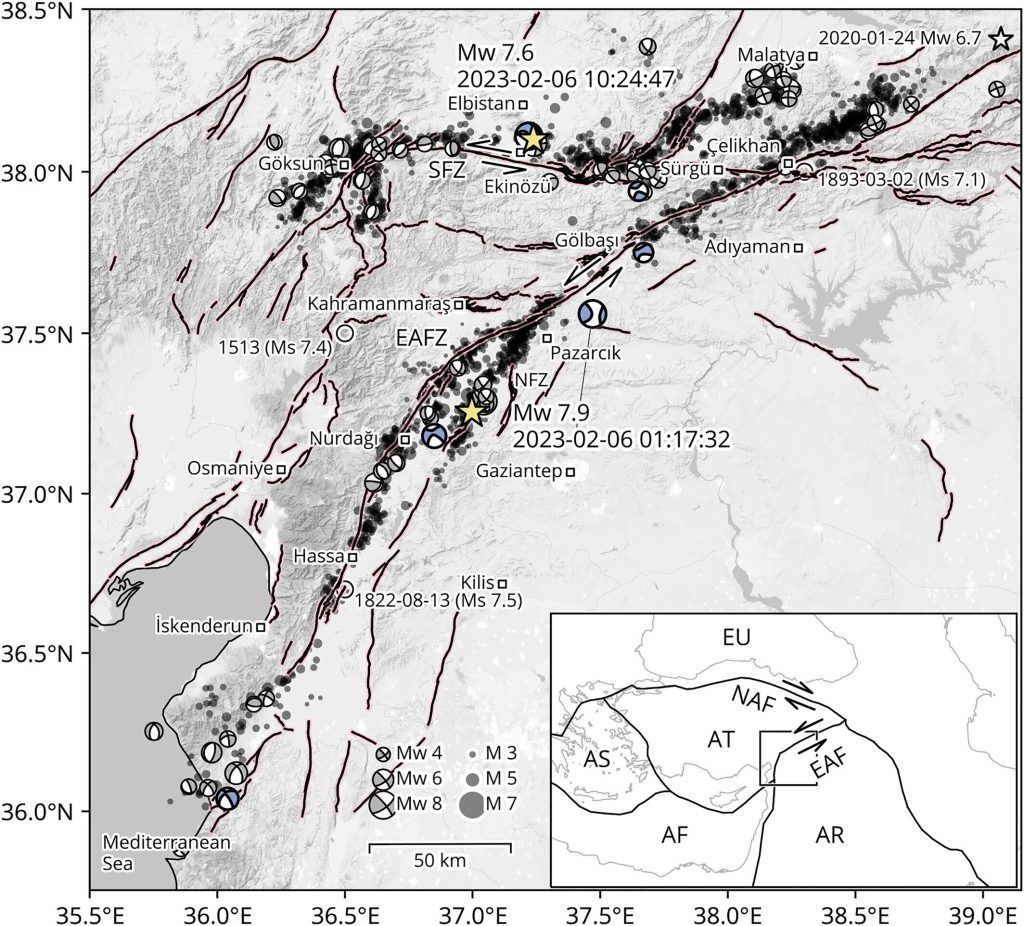Summary of the study region. The yellow stars are the relocated epicenters of the MW 7.9 and MW 7.6 earthquakes. The dots are the relocated aftershocks (M ≥ 1.1) from 2023–02–06 01:17:32 (UTC) to 2023-02-16 21:35:55 (UTC) (after Melgar et al., 2023). The blue beachballs are the Global Centroid Moment Tensor solutions (Dziewonski et al., 1981; Ekström et al., 2012) and the gray beachballs are the focal mechanisms determined by the AFAD (AFAD Focal Mechanism Solution, 2023) during the 2023 earthquake sequence. The active faults are from Emre et al. (2018), including the East Anatolian Fault (EAF) Zone (EAFZ), Sürgü Fault Zone (SFZ), and Narlıdağ fault zone (NFZ). The square markers locate major provinces and towns. The white star is the epicenter of the 2020 MW 6.7 Doğanyol–Sivrice earthquake (Taymaz et al., 2021). The circles are the epicenters of the historical earthquakes (Ambraseys, 1989; Ambraseys & Jackson, 1998). The basemap tiles (terrain) including the administrative boundaries are provided by Stamen Design (under CC BY 3.0 license) and OpenStreetMap (under ODbL license). The inset map shows the boundaries between Aegean Sea (AS), African (AF), Anatolian (AT), Arabian (AR), and Eurasian (EU) plates (Bird, 2003). The arrows denote the relative motion of the EAF and the North Anatolian Fault. The square box outlines the map extent of this figure. Credit: Geophysical Research Letters (2023). DOI: 10.1029/2023GL103480
On February 6, 2023, two major earthquakes with moment magnitudes of 7.9 and 7.6 occurred in southeastern Türkiye, near the Syria-Türkiye border. The two major earthquakes were close in time and space and can be considered twins. The shaking from the earthquakes caused significant damage to buildings, roads, and people.
The source areas of the two earthquakes are where the Anatolian, Arabian, and African plates meet, developing a network of faults with bends, steps, and branches. However, how these fault networks promote and halt rupture growth in actual earthquakes has been elucidated.
A new study published in Geophysical Research Letters analyzed the source processes of the 2023 Türkiye-Syria twin earthquakes and revealed a hierarchical rupture growth through a complex network of faults. Particularly, researchers found that the first earthquake rupture apparently propagated backward, changing the rupture direction like a boomerang as the rupture grew from a minor fault, which branched sharply from the main fault to a larger-scale rupture at the main fault.
In both the earthquakes, the rupture growth was partially at supershear speed. In the second earthquake, fault bending promoted fast rupture growth but abruptly stopped the rupture.
This study revealed that a geometrically complex fault network controlled the earthquake size and rupture propagation speed and direction, leading to multiscale rupture growth from small- to large-scale rupture episodes.
The new findings of the 2023 earthquake doublet display the irregular rupture evolution and diverse triggering behaviors in a single event and across the earthquake sequence, providing critical inputs in understanding earthquake-rupture dynamics and for better assessing future earthquakes.
More information: Ryo Okuwaki et al, Multi‐Scale Rupture Growth With Alternating Directions in a Complex Fault Network During the 2023 South‐Eastern Türkiye and Syria Earthquake Doublet, Geophysical Research Letters (2023). DOI: 10.1029/2023GL103480
Provided by University of Tsukuba
Citation: Seismological analysis of the two earthquakes that devastated southern Turkey (2023, June 26) retrieved 18 July 2023 from https://phys.org/news/2023-06-seismological-analysis-earthquakes-devastated-southern.html
This document is subject to copyright. Apart from any fair dealing for the purpose of private study or research, no part may be reproduced without the written permission. The content is provided for information purposes only.

